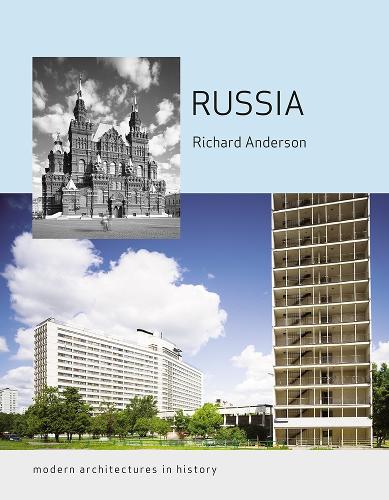
Russia: Modern Architectures in History
(Paperback)
Publishing Details
Russia: Modern Architectures in History
By (Author) Richard Anderson
Reaktion Books
Reaktion Books
1st January 2016
United Kingdom
Classifications
General
Non Fiction
720.947
Physical Properties
Paperback
352
Width 220mm, Height 171mm
Description
Soviet Russia is at the core of this book. Anderson brings the relationshipbetween architecture and socialism into focus through detailed case studiesthat situate buildings and concepts in the specific milieu of Soviet society,politics and ideology. Drawing on extensive research, Anderson provides areappraisal of the architecture of the Stalin era and the final decades of theussr . He accounts for the many ways in which Soviet conventions continueto shape Russian architecture today, but also acknowledges and exploresthe heterogeneous mix of attitudes and style among Russia's architects.
Reviews
This volume in Reaktion's consistently excellent series of studies on Modernisms in specific countries is a long-overdue opening out from the usual confusion at how the country that built St Petersburg and pioneered Constructivism came to be such a world centre of kitsch. * Owen Hatherley, Architectural Review *
[Russia] is a much needed English-language book on the subject, and a valuable source for further research. The tone is careful and measured: Anderson packs 150 years of architectural history into some 300 pages, alongside excellent illustrations. In Russia everything is only ever one step away from politics, and this makes the book particularly exciting: it is an alternative history of Russia and the Soviet Union . . . This is a highly successful, highly readable history told with passion. It opens up new avenues of research and frees us from some previously-held and limiting ideas. It is a level-headed, intelligent assessment that broadens the range and depth of understanding of Russia's architecture. * C20 Magazine *
This is an elegant recasting of the modern architectural tradition in Russia. Spanning 150 years, from the reforms introduced by Alexander II in 1861 and the subsequent industrial urbanization of the Romanov Imperium, to the abstract constructivism of the avant garde that accompanied the Bolshevik Revolution of 1917, Richard Andersons text moves from the less familiar but more pragmatic Soviet reality of the late 20s, and the later historicizing Socialist Realism that constituted the reactionary architectural production of the Stalinist totalitarian state, to the Russian Federation of today. Anderson has written a precisely articulated, socio-economic cultural history of Russian architecture. * Kenneth Frampton, Ware Professor of Architecture, Graduate School of Architecture, Planning and Preservation, Columbia University. *
Author Bio
Richard Anderson is Lecturer in Architectural History at the University of Edinburgh. He is the editor and principal translator of Ludwig Hilberseimers Metropolisarchitecture and Selected Essays (2012) and co-author of Architecture in Print: Design and Debate in the Soviet Union, 19191935 (2005).
